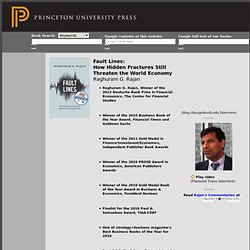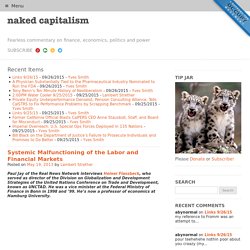

The Next Crisis. Rajan, R.G.: Fault Lines: How Hidden Fractures Still Threaten the World Economy. Raghuram Rajan was one of the few economists who warned of the global financial crisis before it hit.

Now, as the world struggles to recover, it's tempting to blame what happened on just a few greedy bankers who took irrational risks and left the rest of us to foot the bill. In Fault Lines, Rajan argues that serious flaws in the economy are also to blame, and warns that a potentially more devastating crisis awaits us if they aren't fixed. Rajan shows how the individual choices that collectively brought about the economic meltdown--made by bankers, government officials, and ordinary homeowners--were rational responses to a flawed global financial order in which the incentives to take on risk are incredibly out of step with the dangers those risks pose. He traces the deepening fault lines in a world overly dependent on the indebted American consumer to power global economic growth and stave off global downturns. Systemic Malfunctioning of the Labor and Financial Markets. Paul Jay of the Real News Network interviews Heiner Flassbeck, who served as director of the Division on Globalization and Development Strategies of the United Nations Conference on Trade and Development, known as UNCTAD.

He was a vice minister at the Federal Ministry of Finance in Bonn in 1998 and ’99. He’s now a professor of economics at Hamburg University. I’m going excerpt a bit more heavily than usual, and focus on the financial markets instead of the labor markets.
The Shadow Banking System. Economic Theory. Why is macroeconomics such a mess? - 2011 - Events - drop-in-templates - Public events. The Financialization of the world economy. Structured Finance / Derviatives / Securitization. "free-market" fundamentalism. Who needs regulation? High Frequency Trading. Resources. To sort...